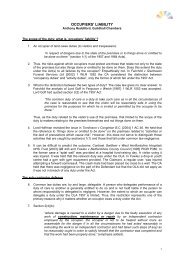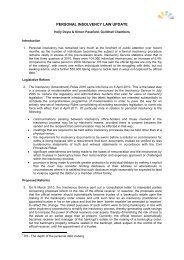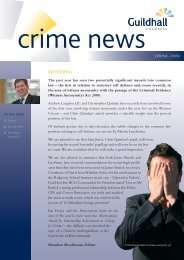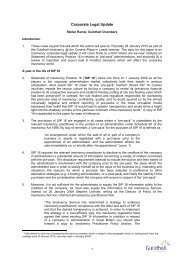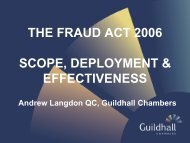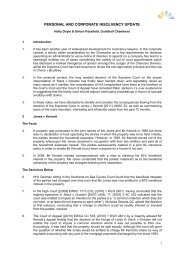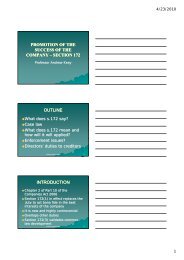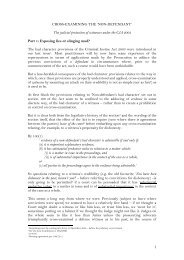Personal and Corporate Update - Holly Doyle & Simon Passfield
Personal and Corporate Update - Holly Doyle & Simon Passfield
Personal and Corporate Update - Holly Doyle & Simon Passfield
You also want an ePaper? Increase the reach of your titles
YUMPU automatically turns print PDFs into web optimized ePapers that Google loves.
25. On 10 May 2011 the sixth hearing was adjourned for sale on a final basis.26. On 5 July 2011 the seventh hearing as used as a directions hearing. G’s solicitor filed a witnessstatement stating that the court had determined that the debtor had a 50% interest in the property<strong>and</strong> the debtor offered to pay £200 per week reduction in the balance pending sale. On 2 August2011 the petitioning creditor filed their evidence in response. The evidence submitted refusal ofthe offer was not unreasonable because G had had a considerable amount of time to sell hisproperty <strong>and</strong> the offer proposed would merely see HMRC rank alongside other charges pendingsale.27. On 5 October 2011 further directions were given at the eighth hearing, but which time MissThompson had been ordered to vacate the property within 14 days of service of the order <strong>and</strong>the price of the property had gone down to £365,000.28. On 20 February 2012 the G’s solicitor put in a final (eighth!) witness statement stating that theasking price had been reduced to a guide price of £300,000 - 350,000, that 3 offers had beenmade, the highest being £300,000, <strong>and</strong> that G could expect to receive £72,000 on sale.29. At the final hearing HMRC submitted that (1) there was a history of delay (2) there was a historyof disorder in G’s tax affairs (3) G had had plenty of time to finance his tax debts <strong>and</strong> to sell hisproperty but there was no guarantee as to when a sale would take place (4) HMRC had astatutory obligation to collect tax <strong>and</strong> was entitled to have regard to its own interests in how it didso <strong>and</strong> (5) HMRC did not have the resources to act as mortgagee <strong>and</strong> oversee a sale - its taskwas to collect tax <strong>and</strong> not act as lender.30. Counsel for G relied upon the adequacy of the security, the fact that there was already an orderfor sale <strong>and</strong> the property was vacant <strong>and</strong> the fact that the duty to collect tax would be betterserved by a charge <strong>and</strong> sale since the recovery would be quicker <strong>and</strong> greater without theinvolvement of a trustee.31. Mr Registrar Baister reviewed the authorities on section 127(3) IA 1986 including Re a Debtor(No 32 of 1993) [1994] 1 WLR 899), HM Customs & Excise v Dougall [2001] BPIR <strong>and</strong> Ross vRevenue <strong>and</strong> Customs Commissioners [2010] 2 All ER 126 <strong>and</strong> gave the principle propositionsthat emerged (non exhaustively) as (at para 23):(1) The starting point is to ask whether a reasonable hypothetical creditor in theposition of the petitioning creditor would accept or refuse the offer, bearing inmind, however, that there could be a range of reasonable positions which sucha creditor could adopt;(2) The test is objective;(3) It is necessary to consider the extent to which the reasonable hypotheticalcreditor may be taken to have the characteristics of the petitioning creditor;(4) The court must look at the position at the date of the hearing;(5) The court is not limited to considering the matters taken into account by thepetitioning creditor when the offer of security was refused; it must look at allthe relevant factors <strong>and</strong> their impact of the reasonable hypothetical creditor;(6) That includes the history;(7) The debtor must be full, frank <strong>and</strong> open in providing the necessary informationto enable the creditor to make an informed decision;(8) A rigid institutional policy of rejecting offers to secure could be a relevantconsideration, since the reasonable hypothetical creditor was obliged toconsider an offer on its merits. “Coherent in-house policies” however, are notnecessarily wrong.(9) A creditor is entitled to have regard to his own interests <strong>and</strong> is not obliged to“take a chance, or to show patience or generosity”.(10) The costs <strong>and</strong> resources implications for the creditor are a “highly materialconsideration”.




